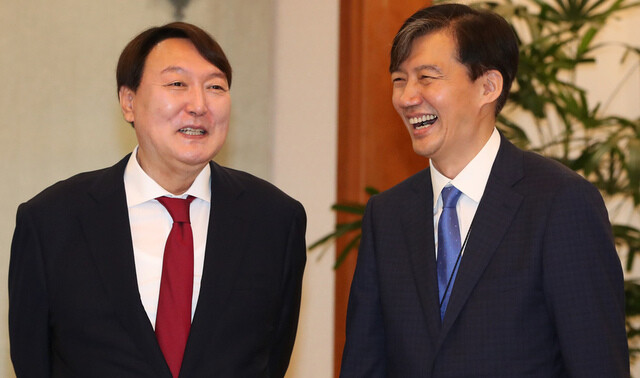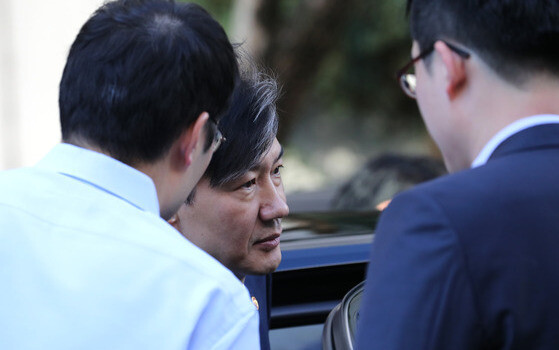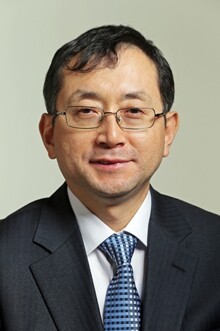hankyoreh
Links to other country sites 다른 나라 사이트 링크
[Column] The division of powers

“Find out who paid the fees for the US attorneys.”
The bribery case involving legal fees for former President Lee Myung-bak’s DAS lawsuit started out purely as a hunch on the part of Yoon Seok-yeol, then the chief of the Seoul Central District Prosecutors’ Office and a former special investigation expert at a law firm. His sense that the US legal costs were too enormous for Lee to have paid on his own proved to be on the mark, and it emerged that Samsung had paid 119 billion won (US$99.77 million) in bribes.
Many have speculated that the latest investigation into allegations against Justice Minister Cho Kuk also started from a combination of previous information collected by the Supreme Prosecutors’ Office and Prosecutor-General Yoon’s own hunch, based on his longstanding experience investigating Lone Star and other funds. Some have referred to Yoon as aiming to personally lay bare the “risk” after Cho was tapped as a nominee for Minister of Justice.
The prosecutors’ decision to dive head-first into the ethics questions surrounding the academic papers and scholarship of the justice minister nominee’s daughter was also reportedly based on the potential for illegalities by a private equity fund. The prosecutors believe the role of Cho’s wife, professor Chung Kyung-shim, went beyond that of a mere investor. They are reportedly questioning other associated figures over allegations that she was the de facto owner of Kolink, which managed stocks under a borrowed name. Chung’s defenders and some ruling party lawmakers have argued that there is no real issue if the matter was simply one of Chung loaning money to Cho’s nephew. Some experts have also contended that no real legal grounds exist for holding her criminally liable as a manager even if she was deeply involved in fund management as an investor.
Quite apart from the substance of the allegations against Cho’s family, there is some room for questioning how the investigation has proceeded to date. It was a particularly self-defeating move on Yoon’s part to conduct a search and seizure operation just after the National Assembly hearing schedule was agreed upon, giving the appearance that he was directly challenging the president’s nomination authority. Having told the nominator that Cho was “unfit” to be the minister of justice, he found himself in the ironic situation of having to prove it as prosecutor-general. It’s unfortunate that he himself furnished grounds for questioning the investigation’s objectivity and neutrality.
Despite 20 or so special investigations prosecutors being put on the case, no “smoking gun” pointing to Cho’s abuse of power has yet been found. That may explain why all the minor allegations keep leaking in dribs and drabs. Does the South Korean public really need to be kept apprised in detail of the ways in which a university commendation was falsified? The leaks concerning “practices out of the movie ‘Parasite’” are particularly dismaying. Some of the reports refer to sources “within the prosecutors.” As smearing goes, this is on par with the “rice paddy watch” (fake news concerning the wife of late former President Roh Moo-hyun). Some have also called the very truth of the allegations into question, arguing that the forgery methods described would have been impossible.
The requirement of objectivity from prosecutors as representatives of the public interest means that priority should be given to the facts, not pre-targeted investigations or blind dirt-digging. This was presumably something Yoon himself affirmed in his inaugural address when he called for seeking proportion and balance and honoring the spirit of the Constitution when considering the opening and closing of investigations. For the current investigation to be justified, it needs to be focused on the abuse of power for corrupt practices, or corrupt practices by a figure in power.
Prosecutors raided Cho’s home on Sept. 23 and appear poised to summon Chung for questioning. With an indictment deadline looming on Oct. 2 for the nephew (also surnamed Cho), questions about Cho Kuk’s fate are likely to surface once again depending on what happens with Chung this week.
Cho is described as having been dismissive early on when the longstanding talk about his appointment as the minister of justice first surfaced back when he was the senior presidential secretary for civil affairs. Varied evidence suggests a strong resolve on President Moon Jae-in’s part to appoint Cho to his Cabinet. Prosecutorial reforms played a key motivating role in his decision to become involved in politics in the first place. Cho has also long dedicated himself to prosecutorial reforms, participating actively in civic group activities since his days as a scholar. From the time of Cho’s appointment as senior secretary, Moon appears to have had him in mind as a proxy for achieving those reforms – circumstances that also played a likely role in his feeling unable to turn down the post.

As the prosecutors’ investigation has gone on, the public has been critical of Cho staying on as minister. The Blue House has said it does not intend to be swayed by the swings of emotion, but the mood is rather different within the ruling Democratic Party, which has a general election to contest next year. If party support ratings plummet once again, the situation could take a turn.
Indeed, the controversy surrounding Cho has passed the point where others would have resigned in the past. The intentness of his supporters and Moon on keeping him where he is cannot be explained in any other terms but the cause of prosecutorial reform. And the question of whether he can sustain momentum for those reforms is likely to be the standard for determining whether he stays or goes.
The sacrifices made by the 86 generation

The so-called “86 generation” has faced numerous criticisms, but its core is made up of people who forsook personal advancement and success in their youth to achieve the greater value of democracy. I believe the kind of “engagement” that Cho has talked about is an extension of this.
By Kim Ri-taek, editorial writer
Please direct comments or questions to [english@hani.co.kr]

Editorial・opinion
![[Column] The state is back — but is it in business? [Column] The state is back — but is it in business?](https://flexible.img.hani.co.kr/flexible/normal/500/300/imgdb/original/2024/0506/8217149564092725.jpg) [Column] The state is back — but is it in business?
[Column] The state is back — but is it in business?![[Column] Life on our Trisolaris [Column] Life on our Trisolaris](https://flexible.img.hani.co.kr/flexible/normal/500/300/imgdb/original/2024/0505/4817148682278544.jpg) [Column] Life on our Trisolaris
[Column] Life on our Trisolaris- [Editorial] Penalties for airing allegations against Korea’s first lady endanger free press
- [Editorial] Yoon must halt procurement of SM-3 interceptor missiles
- [Guest essay] Maybe Korea’s rapid population decline is an opportunity, not a crisis
- [Column] Can Yoon steer diplomacy with Russia, China back on track?
- [Column] Season 2 of special prosecutor probe may be coming to Korea soon
- [Column] Park Geun-hye déjà vu in Yoon Suk-yeol
- [Editorial] New weight of N. Korea’s nuclear threats makes dialogue all the more urgent
- [Guest essay] The real reason Korea’s new right wants to dub Rhee a founding father
Most viewed articles
- 1[Column] Why Korea’s hard right is fated to lose
- 2Amid US-China clash, Korea must remember its failures in the 19th century, advises scholar
- 3[Column] The state is back — but is it in business?
- 460% of young Koreans see no need to have kids after marriage
- 5Trump’s talk of flouting NATO promises sparks apprehension in Seoul
- 6New sex-ed guidelines forbid teaching about homosexuality
- 7South Korea officially an aged society just 17 years after becoming aging society
- 81 in 5 workers at mid- to large-size Korean companies already affected by AI
- 9[Column] Can Yoon steer diplomacy with Russia, China back on track?
- 10Presidential office warns of veto in response to opposition passing special counsel probe act